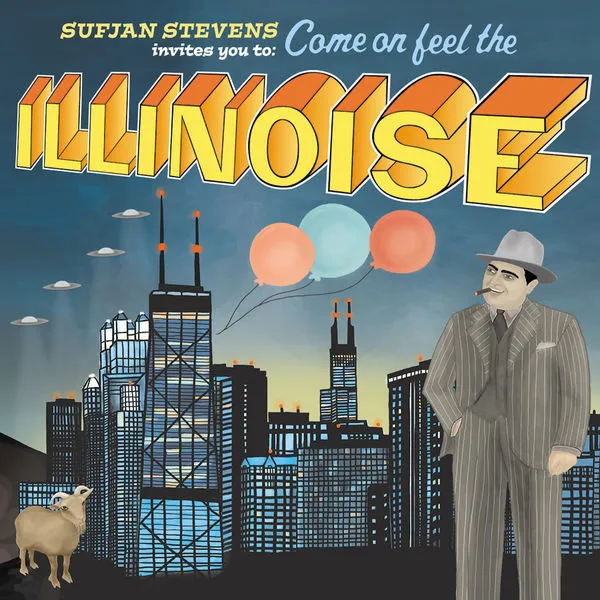Prairies and sky-scrapers, wars and World’s Fairs, steel towns and serial killers: in a masterclass of composition, Sufjan Stevens captured the Prairie State in technicolor in his fifth studio album, Illinois, a record that is as tender as it is theatrical.
Stevens had famously set out to write an album for every state in America, and the “comically ambitious” gimmick was abandoned after only two installments, but both albums, Michigan (2003) and Illinois (2005), made a permanent mark on indie music. Illinois, upon its release in June 2005, catapulted him into the spotlight, and in the frontier of new folk, it became the hipster holy grail.
But that was twenty years ago— does a record full of intricate interludes, Broadway-style choral pieces, and historically inspired lyrics, a record with so many references it’s impossible to track them all, hold up after so much time? Is it still Sufjan Stevens’ defining work?
The answer is simply, yes. It’s still breathtaking, an eclectic, triumphant survey of a state, and an intimate window into Stevens’ life, all at once.
There’s a thin line between personal and state history in Illinois, a line which Stevens dances around. In “Casimir Pulaski Day,” a song so sad it makes the banjo sound devastating, he tells about the death of a childhood friend on an Illinois-specific holiday. Some of the most powerful moments on the record come from his gentle honesty in songs like these: “we lift our hands and pray over your body, but nothing ever happens.” One of Stevens’ greatest strengths as a lyricist is his ability to make the simple sound profound. When placed against the background of lush, complex compositions, his words feels like a revelation: “I fell in love again, all things go.”
There are certainly heartbreakers on the record, but what is maybe less talked about is Stevens’ sense of humor. The song titles themselves are comically convoluted—”They Are Night Zombies!! They Are Neighbors!! They Have Come Back from the Dead!! Ahhhh!” to give an example—and Stevens at times leans into the inherent silliness of telling these stories on his chosen stage without ever being cynical. In a personal favorite of mine, “The Man of Metropolis Steals Our Hearts,” he talks about the town of Metropolis, IL, through references to Superman, with lyrics that are both heartfelt and ever-so-slightly ridiculous: “only a steel man can be a lover, if he had hands to tremble all over.”
But perhaps the crown jewel of Illinois is Stevens’ instrumental arrangements. They’re lilting and buoyant, unapologetically baroque, and melancholy when it counts. Nearly every track has some featured element setting it apart—the bass in “Night Zombies,” flute in “Predatory Wasp of the Palisades,” or percussion in “The Tallest Man”. Rarely will you find a composer who can marry trumpet and acoustic guitar as beautifully as Stevens does in “Man of Metropolis.”
Something interesting is happening in every song, but there is still a distinct, uniform sound for the album as a whole. There are motifs scattered throughout, like the use of glockenspiel on the grander theatrical tracks and the bright, sweet backing vocals from the Illinoismaker Choir. The sound is youthful and optimistic, the very spirit of American idealism that Stevens’ is trying to capture, and it has an instantly recognizable identity; Stevens proves, again, that he is an absolute original.
Today, twenty years have not tarnished Illinois’ sound nor legacy. Since its release, it has gone certified Gold by the RIA and even inspired a 2023 Broadway musical/dance revue, Illinoise. (When I think “jukebox musical”, I truly cannot imagine Sufjan as an obvious choice, but it’s a testament to his storytelling, talent as a composer, and the lasting impact of the album that it exists.)
And as I was revisiting Illinois this past summer, what struck me the most was how thoughtful it is, and how Stevens commits to creating an experience from start to finish. The record is not perfect—there are moments that drag on, and the average folk/indie listener might not be interested in civil war heroes or orchestral suites—but appreciating the record takes patience and time. The records’ highs, which include “Chicago” and “Predatory Wasp of the Pallisades,” are not automatically digestible, and yet some of indie’s very best. That thoughtfulness and intention is something I find lacking in lots of entertainment today, something I think people are yearning for.
Illinois is art purely for art’s sake, pretentious as it may be, and it’s Stevens’ artistry and storytelling that make the album so compelling and dear to our hearts. He sings of history like he was there, of historical figures like he knew them, and makes Illinois jump off a map right in front of us. It has become a perennial classic, one of indie’s most beloved and enduring records, and for good reason.
Ultimately, Sufjan Stevens himself may insist that “all things go,” but twenty years have proven that Illinois is here to stay as a staple in the indie music canon.
Genre: indie folk, chamber folk, indie rock
Length: 22 tracks, 74 minutes
Rating: 9.6/10


Leave a Reply